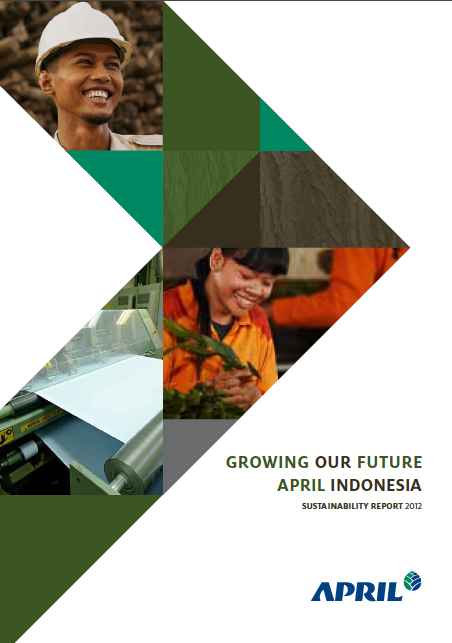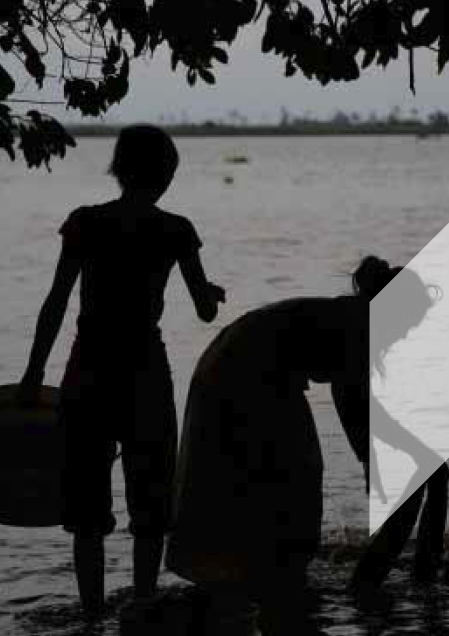Our vision is to become one of the largest and best-managed sustainable pulp and paper companies in the world and the preferred supplier to our customers. Operating sustainably is an essential part of this vision.
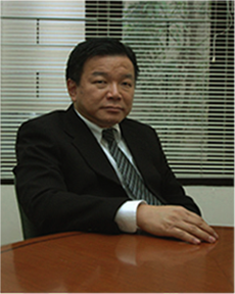 Kusnan Rahmin, President Director, APRIL IndonesiaThe theme of our 2011-2012 sustainability report is Growing our Future.
Kusnan Rahmin, President Director, APRIL IndonesiaThe theme of our 2011-2012 sustainability report is Growing our Future.
We felt this theme expressed APRIL’s journey toward best practice, sustainable forestry in Indonesia. It also reflects our belief that responsible development can build a better future for Indonesia, by helping local people break the poverty cycle and improve their lives.
Operating in a country that is changing at almost every level brings many challenges for APRIL. Meanwhile, we are supplying a world where sustainability is now a key criterion against which businesses are evaluated.
In this complex, ever-changing context, our vision, created almost two decades ago, is as relevant as ever. We aim to become one of the largest and best-managed sustainable pulp and paper companies in the world. And we are proud to do this from our home base in Indonesia, in a way that best meets this country’s needs.
Indonesia has a strong imperative to find the right development path.
In this country of 238 million people, almost 30 million still live below the poverty line. Poverty is particularly widespread in rural areas.
Indonesia is rightly using its abundant natural resources to bring prosperity to its people and overcome many challenges in employment, health, education and infrastructure.
The key question is: how to best use these natural resources to generate enduring economic growth and long-term social benefits, while protecting sensitive environments?
At APRIL, we believe the principles of Sustainable Forest Management (SFM) are an important part of the solution and we have pioneered the introduction of SFM to Indonesia.
Our plantations are designed as renewable sources of economic growth and social development, while our world-class mill operations add significant value and create economies of scale and opportunities that benefit our local, rural area.
In contrast, other approaches are often driven by the immediate realities of life in Indonesia at this stage of its development. Important forests, which can include ecologically sensitive areas, are frequently decimated by people operating illegally, or without regard to the balance between environmental, social and economic sustainability.
In terms of meeting Indonesia’s long-term needs, there is little doubt which approach is preferable.
Indonesia is a young democracy facing some big challenges. In time, it will cement its place as a world-leading economy. Responsible, sustainable development is fundamental to this journey.
APRIL is proud to be playing a part in growing Indonesia’s future.
This sustainability report marks 10 years of full and transparent formal sustainability reporting by APRIL. In fact APRIL was the first major Indonesian company to publish a sustainability report back in 2002 and we have maintained and enhanced our reporting biannually ever since.
In every sector of business, sustainability has become increasingly important and we work hard to meet expectations in this area. Accordingly, this Sustainability Report follows GRI 3.1 guidelines.
We provide comprehensive information on each aspect of our operations in Indonesia and the relationships between our activities and key stakeholders. The Report covers our directly owned operations and how we work with and seek to influence for the better our diverse wood supply partners. It provides facts, statistics and perspectives resulting from our 19 years of operations and experience in Indonesia.
As a privately owned, non-listed company we do not disclose commercially confidential information, but we have endeavored in this report to continue our policy of enhancing relevant disclosures on our operations and sustainability practices. We have increased the number of GRI Indicators reported against (compared to our previous Sustainability Report) from 35 to 45. All data used in this report has been validated by APRIL and in many aspects, by third parties.
Indonesia is in the midst of change at almost every level and it is an exciting time of growth and opportunity for Indonesians, with GDP up by 6.2% in 2012.
In the past five years, forest-based industries including pulp and paper represented around 3.5% of Indonesia’s economy, or around USD21 billion. The industry also contributed 8.3% of manufacturing value-add and provided employment for around 3.76 million people.
APRIL Indonesia is a significant player in the pulp and paper industry. We directly employ 5,400 people and create consequential employment opportunities for around 90,000 people.
Importantly, as our operations are based in Riau Province, Sumatra, the benefits are flowing to the local rural economy, where they are often needed most. Riau is home to 5.5 million people and is Indonesia’s third largest provincial economy. A study referenced in this Report has shown that between 1999 and 2010, APRIL contributed 6.1% of Riau’s GDP.
Unlocking the benefits of this positive economic contribution depends upon productivity and we have been progressively optimising production from our Kerinci mill. As the chart below shows, in 2012, APRIL produced and sold 2.67 million tonnes of pulp.
Figure 1: APRIL PULP PRODUCTION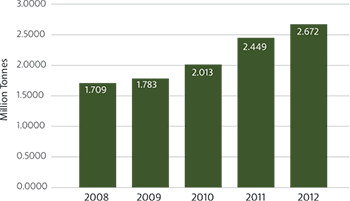 Figure 2: APRIL PAPER PRODUCTION
Figure 2: APRIL PAPER PRODUCTION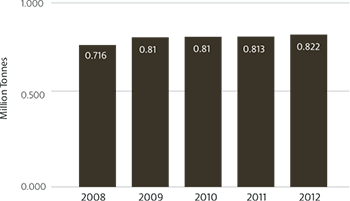
A proportion of our pulp production is converted to paper after downstream processing at the Kerinci site. In 2012 0.822 million tonnes of paper were produced and sold.
Our commercial viability and our ongoing contribution to Indonesia’s economy are predicated on our concession areas being managed in a sustainable way that ensures long-term productivity. Sustainable development can be defined as using resources to meet human needs while ensuring the sustainability of natural systems and the environment, so that these needs can be met in the present, but also for generations to come.
Our operations must be sustainable, in the true sense of the word. They must endure and continue to contribute. Responsible forestry is the key.
We recognize that through practicing responsible forest management in our own operations, and encouraging it among our supply partners, APRIL can be an important pillar in the ongoing growth and development of a world-class Indonesian forest industry. As such, we strive for world best practice in sustainable forestry.
Deforestation in Indonesia is a real concern, both here and around the world. A common criticism leveled at companies like ours is that by establishing plantations, we are contributing to deforestation.
However, we strongly believe that, rather than being part of the problem, we are part of the solution to the challenges Indonesia is facing in striking the right balance between economic development and environmental management. By practicing responsible forestry, we are making productive use of land that has been degraded in the past and would be likely to be further degraded were it not for our presence.
Our plantations are managed in line with world best practices, while the significant conservation zones within our concessions are well protected. We take pride in the fact that the conservation outcomes being achieved in APRIL conservation zones are having a lasting positive impact and compare favourably with outcomes in forests protected under different arrangements; and demonstrably better than in unmanaged land.
Equally, forestry in Indonesia has a decidedly human face. The jobs created and the economic benefits generated are shared with local communities. We do not however take anything for granted. We work hard through a detailed process of engagement to understand and to meet the needs and wishes of local communities.
As in any community setting that features diverse backgrounds, cultures and ambitions for the future, such community engagement is complex, particularly given that Indonesia’s land tenure system is sometimes confusing and contradictory.
Ensuring positive relationships with local communities and the objective, transparent resolution of disputes through dialogue is important to our business and to our reputation.
The development and growth of APRIL’s business has taken place in stages. APRIL’s first plantation development commenced in Riau Province in Sumatra, Indonesia in 1993. In Kerinci, Riau, we began commercial pulp production in 1995 and commercial paper production in 1998.
APRIL’s pulp and paper mill is one of the world’s largest and most modern. It is export competitive, low cost, and highly efficient, with a designed capacity of 2.8 million tonnes per annum. Kerinci is home to one of the largest single pulp production lines and fastest fine paper machines in the world.
We believe our Kerinci mill serves as an example of the true potential and capability of Indonesian manufacturing. (You can read about this mill and its environmental performance in section 3 of this Report).
Over the past two years we have made important progress towards our objective of completing the program of plantation establishment on new concession areas licensed to us in 2009.
As at 30 June 2013, APRIL had less than 20,000 hectares still to be established as plantations within our concessions, primarily on the island of Pulau Padang. This is balanced by nearly 90,000 hectares identified and protected as conservation forest and indigenous tree species areas within those same concessions. When the conservation and indigenous tree species areas set aside by both APRIL and long-term supply partners are combined, they account for more than 220,000 hectares.
Today, APRIL is one of the world’s largest pulp and paper companies and a leading fibre plantation company. Key markets are served across Asia Pacific and further afield in Europe. Our operations are among the most efficient of their kind. As a leading producer of pulp and paper, APRIL Indonesia engages with customers across the globe that demand of us the highest standards of governance, compliance and commitment to responsible forestry practices.
APRIL’s practices are guided by the principles of the United Nations Global Compact and ISO26000 Social Responsibility Guidance. We have stringent chain of custody policies and procedures controlling fibre supply, while our mill operation is engineered to meet European Best Available Technology (BAT) and is certified under ISO 9001, ISO 14001 and OHSAS 18001 for quality, environment, and health and safety management systems respectively.
In 2011, APRIL achieved Origins and Legality of Timber (OLB) certification, with assurance from Bureau Veritas for our entire forestry and manufacturing operations. We were also recertified for Sustainable Plantation Forest Management (SPFM) certification by the Lembaga Ekolabel Indonesia (LEI), for 2011-2016.
In 2012, we received Sustainable Production Forest Management (PHPL) and Timber Legality Verification (SVLK) Certification from the Indonesian Ministry of Forestry, covering our entire manufacturing operations.
This report details many things of which we are proud: the opportunities we offer our employees; the positive impact we have on poverty alleviation in Riau; the improved living standards we create in our communities; the world-class nature of our operations and the quality of our end products.
Nonetheless, a major issue that I must address in this President Director’s Report is that of employee and contractor safety.
Over the 2011 and 2012 years, 22 people lost their lives while working for APRIL and its contracted suppliers. The majority of these incidents involved valued contractors to our company. This situation cannot continue.
Consequently, APRIL is overhauling its occupational health and safety systems, particularly those related to contractor safety management. This is a major project. Although our work in this area must recognize that the inherently hazardous nature of forestry is being exacerbated by the remoteness of our plantations and relatively low education levels, particularly among contractors, we simply must meet the challenge of achieving a safe work environment.
It is vital that we demonstrate to our employees, contractors and their families that APRIL’s operations will become safer. We are determined to present a very different picture in our next Sustainability Report.
The work being done in this critical area is outlined in section 6.4 of this Report.
While this Sustainability Report covers a specific two-year period, it also covers a range of new and enhanced commitments being made to enhance our triple bottom line of people, planet and profit.
We are resolved to boost safety for our workers and others through such measures as improved contractor safety management systems and increased mechanisation of harvesting activities, reducing the levels of manual clearance.
We are continuing to develop major, longterm eco-restoration programmes in Riau Province and on the Kampar Peninsula.
And as world demand for pulp and paper products grows, we will take further steps to showcase our commitment to sustainable development.
In a rapidly changing country, with a great need for the benefits of economic growth, we believe responsible forestry has much to contribute to Indonesia’s future.

President Director
APRIL Indonesia
30 August 2013
The figures and statements reflecting GRI indicators assured by Ernst & Young LLP are marked with an “*” in the report.
